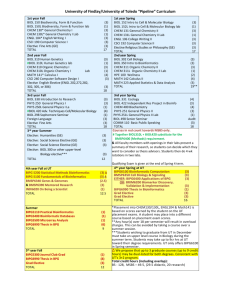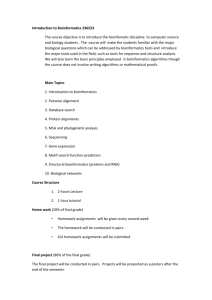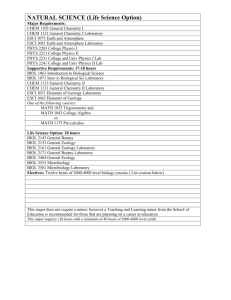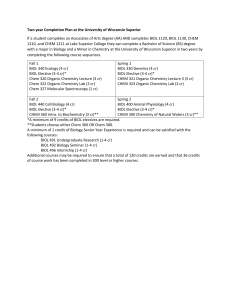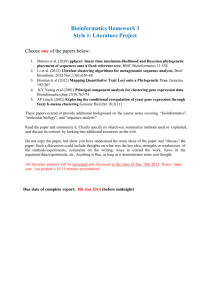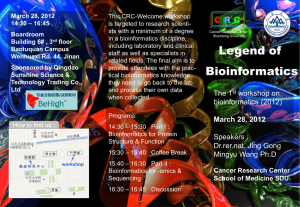About bioinformatics: Bioinformatics is the intersection between
advertisement
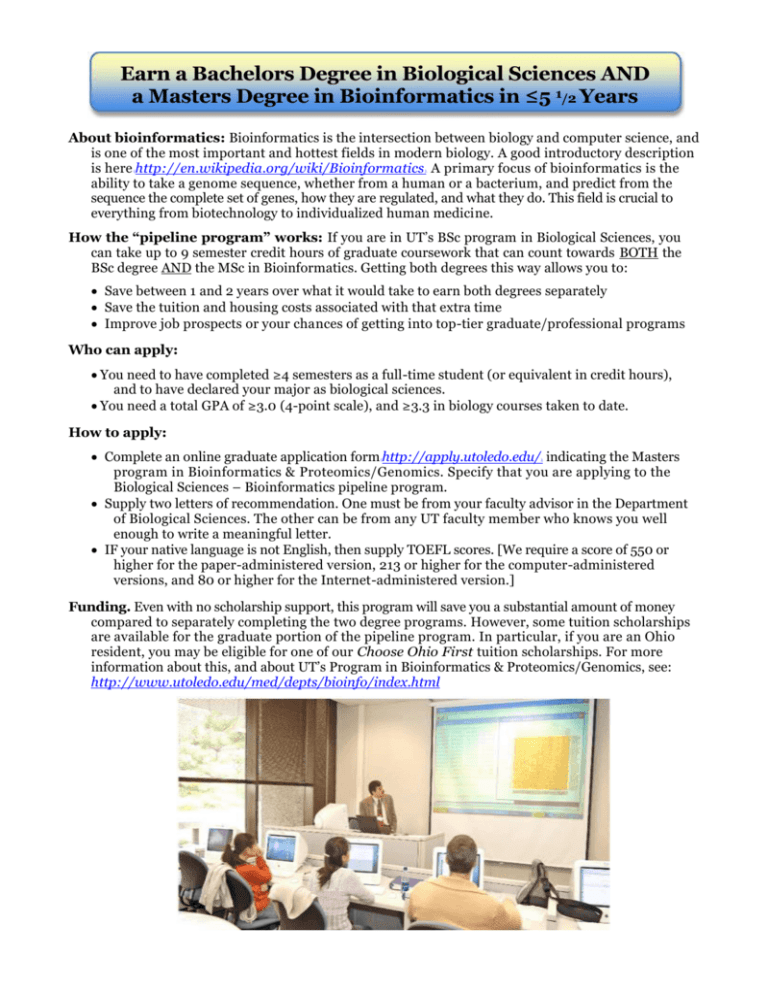
Earn a Bachelors Degree in Biological Sciences AND a Masters Degree in Bioinformatics in ≤5 1/2 Years About bioinformatics: Bioinformatics is the intersection between biology and computer science, and is one of the most important and hottest fields in modern biology. A good introductory description is here http://en.wikipedia.org/wiki/Bioinformatics A primary focus of bioinformatics is the ability to take a genome sequence, whether from a human or a bacterium, and predict from the sequence the complete set of genes, how they are regulated, and what they do. This field is crucial to everything from biotechnology to individualized human medicine. ( ). How the “pipeline program” works: If you are in UT’s BSc program in Biological Sciences, you can take up to 9 semester credit hours of graduate coursework that can count towards BOTH the BSc degree AND the MSc in Bioinformatics. Getting both degrees this way allows you to: Save between 1 and 2 years over what it would take to earn both degrees separately Save the tuition and housing costs associated with that extra time Improve job prospects or your chances of getting into top-tier graduate/professional programs Who can apply: You need to have completed ≥4 semesters as a full-time student (or equivalent in credit hours), and to have declared your major as biological sciences. You need a total GPA of ≥3.0 (4-point scale), and ≥3.3 in biology courses taken to date. How to apply: Complete an online graduate application form http://apply.utoledo.edu/ indicating the Masters program in Bioinformatics & Proteomics/Genomics. Specify that you are applying to the Biological Sciences – Bioinformatics pipeline program. Supply two letters of recommendation. One must be from your faculty advisor in the Department of Biological Sciences. The other can be from any UT faculty member who knows you well enough to write a meaningful letter. IF your native language is not English, then supply TOEFL scores. [We require a score of 550 or higher for the paper-administered version, 213 or higher for the computer-administered versions, and 80 or higher for the Internet-administered version.] ( ), Funding. Even with no scholarship support, this program will save you a substantial amount of money compared to separately completing the two degree programs. However, some tuition scholarships are available for the graduate portion of the pipeline program. In particular, if you are an Ohio resident, you may be eligible for one of our Choose Ohio First tuition scholarships. For more information about this, and about UT’s Program in Bioinformatics & Proteomics/Genomics, see: http://www.utoledo.edu/med/depts/bioinfo/index.html 1st year Fall BIOL 2150 Fundamental of Life Science I BIOL 2160 Fundamental of Life Science I lab CHEM 1230 General Chemistry I CHEM 1280 General Chemistry I Lab ENGL 1110 Composition I ARS 1000 Orientation A&S Elective TOTAL 2nd year Fall BIOL 3010 Molecular Genetics BIOL 3020 Molecular Genetics lab # CHEM 2410 Organic Chemistry I CHEM 2460 Organic Chemistry I Lab MATH 1750 or 1850 (Calculus I) A&S Elective TOTAL 3rd year Fall BIOL 3090 Developmental Biology PHYS 2070 or 2130 General Phyiscs I Foreign Language I A&S Elective A&S Elective TOTAL Biol‐BPG “Pipeline” Curriculum – Option 1 1st year Spring (4) BIOL 2170 Fundamental of Life Science II (1) BIOL 2180 Fundamental of Life Science II lab (4) CHEM 1240 General Chemistry II (1) CHEM 1250 General Chemistry II Lab (3) ENGL 1130‐50 Composition II (1) A&S Elective (3) TOTAL 17 2nd year Spring (3) BIOL 3030 Cell Biology (2) BIOL 3040 Cell Bio Lab # (3) CHEM 2410 Organic Chemistry II (1) MATH 1760 or 1860 (Calculus II) MATH 2600 Introduction to Statistics (4) (3) A&S Elective 16 TOTAL 3rd year Spring (3) BIOL 3070 Human Physiology (5) PHYS 2080 or 2140 General Phyiscs I (4) Foreign Language II (3) BIOL 4010 Molecular Biology (3) A&S Elective 18 TOTAL Summer A&S Elective (3) A&S Elective (3) TOTAL 6 4th year Fall Foreign Language III (3) BIOL 4700 (3) BIOL 4110 Human Genetics (3) BIPG 520 Statistical Methods Bioinformatics (3)* BIPG 510 Fundamentals of Bioinformatics (3)* INDI 602 On being a Scientist (1) TOTAL 16 Summer BIPG540 Bioinfo Databases BIPG550 MicroArray Analysis BIPG511Practical Bioinformatics BIPG999 Research Thesis in BPG (New course . Approval pending) TOTAL 5th year Fall Grad Elective BIPG530 Journal Club Grad BIPG999 Research Thesis in BPG TOTAL (1) (1) (1) (6) 9 (3) (1) (8) 12 (4) (1) (4) (1) (3) (3) 16 (3) (2) (3) (3) (3) (3) 17 (3) (5) (4) (3) (3) 18 4th year Spring Foreign Language IV (3) BIPG 610 Intro to Bioinformatic Computing (3)* Grad Elective (3) BIPG580 Intro to Biomedical Research (0) % BMSP639 Mentored Res (2) EITHER: BIPG 640 Applications of Bioinfo. (3) OR: BRIM620 Biomarker Discovery, Validation & Implementation (3) BMSP 635 Cell Biology and Signaling (3) TOTAL 17 Courses in red type count towards MSBS only. BIOL 6010 counts for BS only, but fills MSBS req. *These courses provide the 9 cr that count towards both degrees. # Together, BIOL3020 and 3040 substitute for BMSP 640 (Methods) % This is not a formal course, & you do not register for it, but all incoming students must attend because this is how rotation mentors are chosen. All faculty members with openings in their labs present a summary of their research, so students can decide which they want to consider as thesis advisors. Qualifying exam is at end of spring 4 term Total credit hours (including overlap): BS – 129, MSBS – 42 (26 didactic, 14 research) If you have questions about the pipeline program, please talk to your faculty advisor, and/or contact: Ms. Joanne Gray, Bioinformatics Program Secretary – joanne.gray@utoledo.edu Dr. John Gray, Biological Sciences Pipeline Director – jgray5@utnet.utoledo.edu Dr. Bob Blumenthal, Bioinformatics Program Director – robert.blumenthal@utoledo.edu
